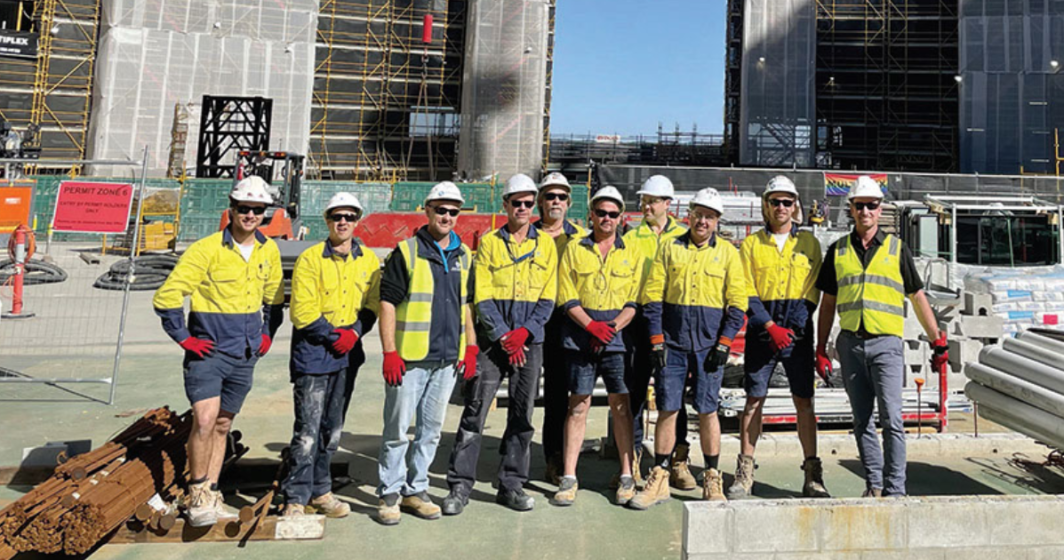The plumbing industry has a problem. We don’t have enough apprentices entering our incredible trade. And yet, we have an abundance of work in the pipeline, schemes to attract apprentices and great pay once qualified. So, what can we do to grow our future workforce?
Scott Dowsett, former President of Master Plumbers, left school at about 14 and started work in his father’s business.
“My story is not unique,” Scott says. “My dad was a plumber, along with his two brothers, therefore making me a second-generation plumber, so I always wanted to be a plumber.

“I left school, not because I didn’t like school, but because I found my passion… Plumbing fascinated me as a young kid, and it still fascinates me today.”
The problem, as Scott sees it, is that the options and benefits for a plumbing career are not known. There are no longer the technical colleges that in the past shone a light on the trades. Secondary schools are now streaming kids toward universities. And plumbers, including plumbing leaders, are not vocal enough about their vocation.
“In Australia, we closed the tech schools and put all our effort into academic learning, paving the way to university and professional services,” Scott observes.
“They say VCAL (Victorian Certificate of Applied Learning) is an option, but in my opinion, and in our business’s, it really is not appropriate training or learning for a trade. Society has really dropped their promotion of trades as a career. The success stories we hold up at schools are not those of people in trades. People may not see plumbing as a hip, cool career, where you can wear designer shirts, jackets or even rock a cool watch. In the early years, there is no doubt I used to shy away from disclosing my employment, often either changing the subject or at least trying to put an alternative spin or upsell of my chosen profession.”
It is hard to believe Scott, a highly successful plumber, business owner and entrepreneur with a strong social heart, would have ever downplayed his passion. Scott now lays claim to more than 36 years’ experience in the commercial plumbing industry. He started his own company in 1992 and joined forces with Chadd Cooke to form Cooke and Dowsett in 2008. The company, which celebrates its 30th anniversary this year, now works across the nation, has undertaken acquisitions and created successful start-ups.
In the past year, Cooke and Dowsett have worked on the GMHBA Stadium in Geelong (having worked on the past four stages), CSL Headquarters, Sunshine Hospital and early works at the Arts Centre Melbourne in Victoria; Queen’s Wharf Casino, B+BUS Properties 443 Queens St in Brisbane; Murdoch Sixty-1 Fifty, Ritz Carlton - EQ, and Broome TAFE in Western Australia; Mainfreight Logistics warehouse and Bunnings Murray Bridge in South Australia; Parliament Square in Tasmania; Dubbo Hospital and Batemans Bay Aquatic Centre in NSW; and Indigo Hotel & Apartments in New Zealand. Despite, COVID-19, supply chain challenges, increased costs and the collapse of some major construction businesses, Cooke and Dowsett, like many in the plumbing industry, have a healthy forward order book and a solid weighted pipeline of opportunities.
Scott has served on the Master Plumbers National Council since 2010 and as President from 2013 until November this year. He has been a committee member of the Major Contractors’ Division since 2006 and is the current Chairman. Scott was also a Director of Master Plumbers Australia and New Zealand Ltd.
Scott has always used his voice to encourage more people in the industry to fly the flag for plumbing. Now he wants you to join him.
“We need to remember to use our own networks to promote plumbing. As family members and magazine readers, we need to talk to families and friends. We need to get proud and hold the flag up.
“Plumbing is only one of two licenced trades left; Plumbing and Electrical,” Scott adds.
“It is not a bad earner once you get your ticket. Doctors stay in school until they’re 28, whereas many of the kids that enter plumbing can buy their first house at 25.”
Plumbers can also travel and work worldwide, with plumbing one of the most in-demand professions. “You can have fun and still plumb,” Scott says.
“Plumbing also has many streams that people are not aware of. Once you get your ticket, you can specialise in many areas: you can start your own small business; you can be a sub-contractor and move around; and you can branch out into hydraulic/civil design, estimating/cost planning, site management and project management. And the best bit, the industry is a staunch supporter of continuous learning. You can get off the training elevator, whenever you like.
“There is a sweet spot for everyone,” Scott says.
Master Plumbers CEO, Peter Daly, says there is more to plumbing than most people understand. In the Master Plumbers policy statement released prior to last month’s Victorian State Election, he said the plumbing industry underpins the key areas of economic, health, community and environmental policies.
“Plumbing often takes a back seat in policy-makers’ minds and yet it is a catalytic function in terms of good public health, a strong construction sector and a thriving economy.”
A well-functioning plumbing industry is vital to Victoria – now more than at any time in Victoria’s history.
“The Victorian economy is still recovering from COVID, lingering supply chain issues and labour shortages,” Peter says.
“Governments, state and federal, have a very significant infrastructure demand in major transport projects, social housing, health and community infrastructure – as well as ongoing demand for homes and services - all of which provides long-term prospects for our industry if we can work through these challenges as we fully expect to.”
“Plumbing skills are going to be key to the economic recovery and will be in increasingly high demand,” Peter says.
The Victorian economy is also about to embark on one of the most ambitious structural adjustment projects ever undertaken in Australia. Victoria has set ambitious targets to reduce its greenhouse gas emissions by 28 to 33 per cent by 2025 and 45 to 50 per cent by 2030. More than 15 per cent of Victoria’s carbon emissions come from natural gas, which is extensively used in Victoria for cooking, hot water and heating. “This will require more plumbers and many new skills in our industry,” Peter says.
In his election night speech late last month, the re-elected Premier Daniel Andrews spoke of the importance of trades, including apprenticeships, and through his campaign he had spoken of the need for more secure jobs; a reinvention of the loyal workplace and the loyal worker.
But it is not just one party or one level of government supporting trades. The former Liberal Federal Government injected another $365 million into tradies’ apprenticeships in a pre-budget pitch to voters. This was an extension of the Boosting Apprenticeship Commencement scheme, which launched in 2020 to create another 35,000 apprenticeships.
Now, under a Labor Federal Government, apprentices still feature. At the time of the election of the Albanese Government, earlier this year, the Chief Executive Officer of the National Apprentice Employment Network (NAEN), Dianne Dayhew, said: “Vocational education and training will be a critical avenue to address skills shortages in many industries, and in building a pipeline of skills for jobs in emerging industries.”
Peter Daly says, “Master Plumbers has worked tirelessly to influence key decision makers and lobby all sides of politics about the critical role that plumbing plays in keeping our economy moving and our communities safe.
“We are continuing to work directly with the new government, key ministers and government departments to ensure that support for apprentices and the industry’s future is secured and that they are held to account on the promises made”.
While all this talk of increasing apprenticeships happens, it is still vital for the industry itself to join Master Plumbers in promoting the importance of the plumbing trade and the scope to forge an impressive career in the industry. “We all need to reflect on how we can promote our industry to our communities,” Scott says. “It is time to look at our industry with a sense of pride and find ways to talk about it to ensure the next generation know plumbing is a solid career option.”
Share this Article






